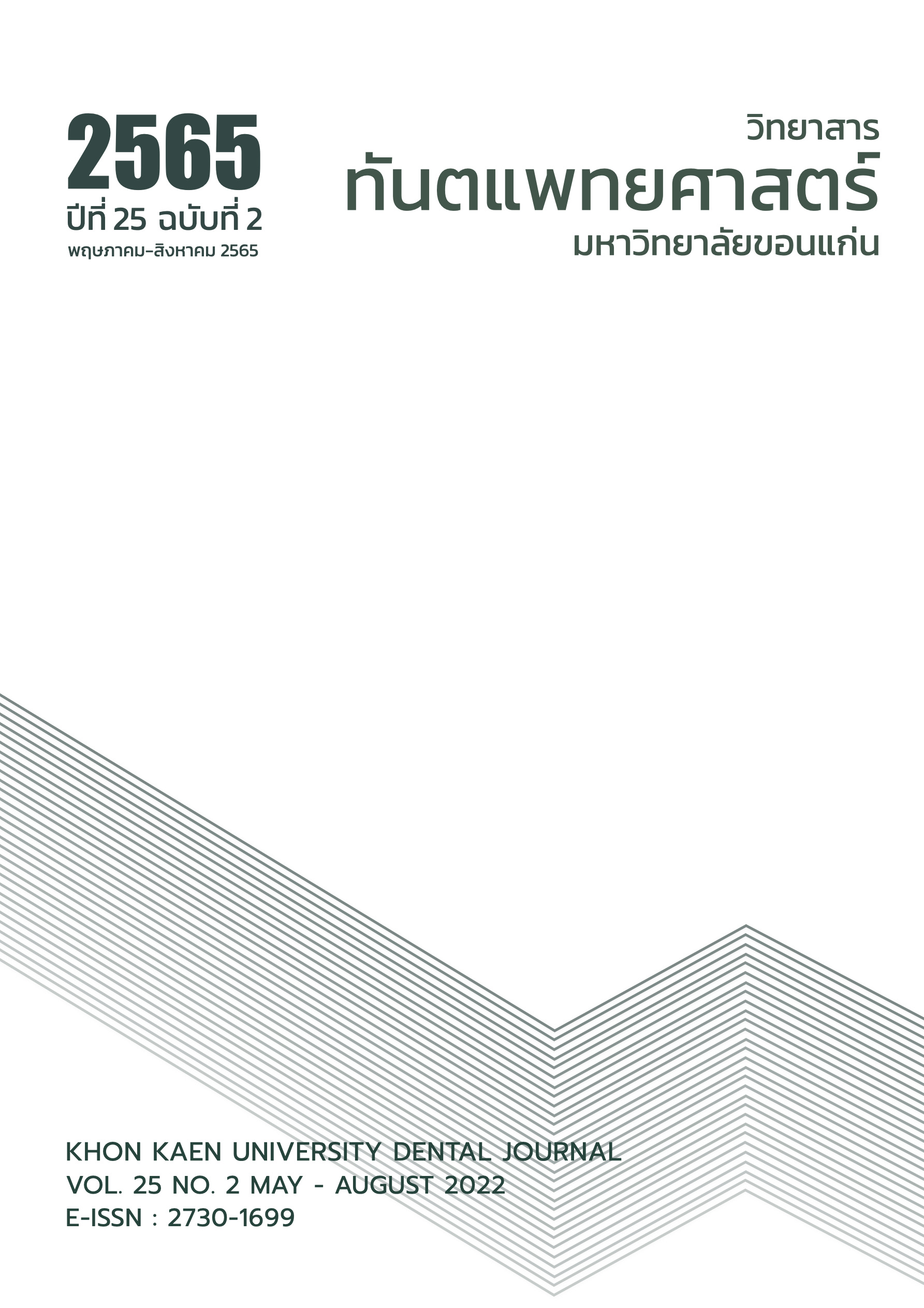Recurrent Oral Aphthous Ulcer: Case Report
Main Article Content
Abstract
Recurrent aphthous ulcer is the common lesion of the oral mucosa. The exact etiology of aphthous ulcer is still unknown. Risk factors, however, that are involved in the development of lesions are stress, food allergy, genetic factors, disorders of the haematologic system, hormonal influence, viral or bacterial infection, trauma, immune system disorders, including syndromes or systemic conditions such as Behcet's syndrome, certain drugs, for instance, non-steroidal anti-inflammatory drugs. Regarding current treatments, there are no drugs capable of causing complete remission. Thus, the main treatment relies on symptomatic treatment by reducing the risk factors that will cause disease and alleviating the patient’s pain from the established ulcers. This case report refers to a 12-year-11-month-old female who had aphthous ulcers on the tongue and oral mucosa for more than one year. The patient had been treated with dexamethasone and doxycycline. Since the patient’s blood examination report demonstrated a slightly decreased hemoglobin and hematocrit, therefore folate was also given for 2 weeks. As a result, the intraoral lesions became smaller, no new lesion was found and the patient had no pain and could speak, masticate, eat, and brush normally. In summary, the success factors in managing recurrent aphthous ulceration are not only using drugs that have adequate potency to diminish inflammation, but also managing the patient holistically to lessen the potential risk factors. For instance, in the present case, the patient was advised to cope with the stress from entrance examination that might promote lesions and to consume food containing iron and vitamin A and taking vitamin C-containing food with iron-containing food in order to increase iron absorption.
Article Details

This work is licensed under a Creative Commons Attribution-NonCommercial-NoDerivatives 4.0 International License.
บทความ ข้อมูล เนื้อหา รูปภาพ ฯลฯ ที่ได้รับการลงตีพิมพ์ในวิทยาสารทันตแพทยศาสตร์ มหาวิทยาลัยขอนแก่นถือเป็นลิขสิทธิ์เฉพาะของคณะทันตแพทยศาสตร์ มหาวิทยาลัยขอนแก่น หากบุคคลหรือหน่วยงานใดต้องการนำทั้งหมดหรือส่วนหนึ่งส่วนใดไปเผยแพร่ต่อหรือเพื่อกระทำการใด ๆ จะต้องได้รับอนุญาตเป็นลายลักษณ์อักษร จากคณะทันตแพทยศาสตร์ มหาวิทยาลัยขอนแก่นก่อนเท่านั้น
References
Tarakji B, Gazal G, Al-Mawer SA, Azzeghaiby SN, Alaizari N. Guideline for the Diagnosis and Treatment of Recurrent Aphthous Stomatitis for Dental Practitioners. J Int Oral Health 2015;7(5):74-80.
Koberová R, Merglová V, Radochová V. Recurrent Aphthous Stomatitis in Children: A Practical Guideline for Paediatric Practitioners. Acta Medica (Hradec Králové) 2020;63(4):145-9.
Preeti L, Magesh KT, Rajkumar K, Karthik R. Recurrent aphthous stomatitis. J Oral Maxillofac Pathol 2011;15(3):252.
Miller MF, Garfunkel AA, Ram C, Ship II. Inheritance patterns in recurrent aphthous ulcers: twin and pedigree data. Oral Surg 1977;43(6):886-91.
Slebioda Z, Szponar E, Kowalska A. Recurrent aphthous stomatitis: genetic aspects of etiology. Postep Derm Alergol 2013;30(2):96-102.
Sharma D, Garg R. A comprehensive review on aphthous stomatitis, its types, management and treatment available. J Develop Drugs 2018;7(2):1-8.
Belenguer - Guallar I, Jimenez - Soriano Y, Claramunt-Lozano A. Treatment of recurrent aphthous stomatitis. A literature review. J Clinl Exp Dent 2014;e168-74.
Kurihara A, Ohuchi K, Tsurufuji S. Reduction by dexamethasone of chemotactic activity in inflammatory exudates. Eur J Pharmacol 1984; 101(1-2):11-6.
Aggarwal H. Efficacy of low-level laser therapy in treatment of recurrent aphthous ulcers – A sham controlled, split mouth follow up study. J Clin Diagn Res 2014;8(2):218-21.
Casu C, Mannu C. Atypical afta major healing after photodynamic therapy. Case Rep Dent 2017; 2017:8517470.
Pulverer G. Doxycycline-a broad spectrum antibiotic of the tetracycline series. (German) Med Klin 1969;64(22):1033-7.
Piacentini M, Borghetti RL, de Figueiredo MAZ, Cherubini K, Salum FG. Doxycycline: An option in the treatment of ulcerated oral lesions? J Clin Pharm Ther 2019;44(6):838-43.
Thongprasom K, Youngnak P, Aneksuk V. Hematologic abnormalities in recurrent oral ulceration. Southeast Asian J Trop Med Publ Health 2002;33(4):872-7.
Chiang CP, Yu-Fong Chang J, Wang YP, Wu YH, Wu YC, Sun A. Recurrent aphthous stomatitis-Etiology, serum autoantibodies, anemia, hematinic deficiencies, and management. J Formos Med Assoc 2019;118(9):1279-89.
Locasale JW. Serine, glycine and one-carbon units: cancer metabolism in full circle. Nat Rev Cancer 2013;13(8):572-83.
Shefrin AE, Goldman RD. Use of dexamethasone and prednisone in acute asthma exacerbations in pediatric patients. Can Fam Physician 2009; 55(7):704-6.
Lynde CB, Bruce AJ, Rogers RS, Successful treatment of complex aphthosis with colchicine and dapsone. Arch Dermatol 2009;145(3):273-76.
Thornhill MH, Baccaglini L, Theaker E. A randomized, double-blind, placebo-controlled trial of pentoxifylline for the treatment of recurrent aphthous stomatitis. Arch Dermatol 2007;143(4):463-70.
Kiely PD, Gillespie KM, Oliveira DB. Oxpentifylline inhibits tumor necrosis factor-α mRNA transcription and protects against arthritis in mercuric chloride–treated brown Norway rats. Eur J Immunol 1995;25:2899-906.
Al-Maweri SA, Halboub E, Ashraf S, Alqutaibi AY, Qaid NM, Yahya K, et al. Single application of topical doxycycline in management of recurrent aphthous stomatitis: a systematic review and meta-analysis of the available evidence. BMC Oral Health 2020;20(1):231.


